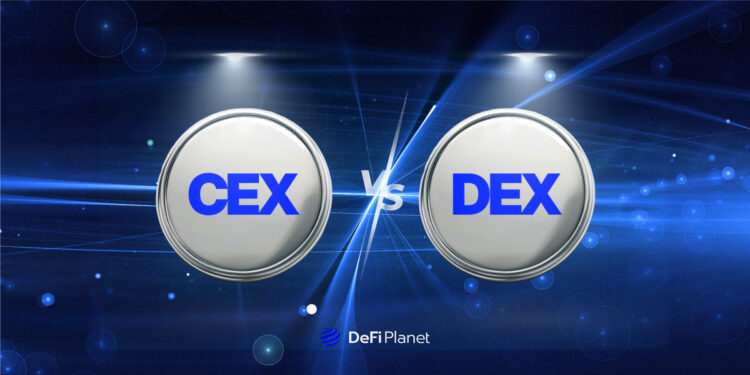Choosing between Centralized Exchanges (CEX) and Decentralized Exchanges (DEX) is one of the most important decisions crypto traders face. While both platforms let users buy, sell, and trade digital assets, they work in very different ways.
Understanding these differences is key to making informed decisions. Your choice of exchange can impact security, fees, transaction speed, and overall experience, making it an essential factor for beginners and experienced traders.
This article will explore the key differences between CEXs and DEXs, highlighting the benefits of each platform, who they are best suited for, and the factors you should consider when choosing the right exchange for your needs.
Comparing CEX vs DEX: Key Differences

Understanding Centralized Exchanges (CEX)
A CEX is a platform that acts as a middleman between buyers and sellers in cryptocurrency trading. Popular examples include Binance, Coinbase, and Kraken. Centralized exchanges handle everything from matching buy and sell orders to securing transactions and storing your assets. They’re similar to traditional stock exchanges, where a central authority manages everything, offering users trust and security.
In a CEX, intermediaries manage user accounts, facilitate trades, and ensure regulations are followed. This means users don’t directly trade with each other, they go through the exchange, which adds an extra layer of security and control.
How a CEX Works
CEX platforms use an order book system, where buy and sell orders are listed. Market makers and liquidity providers help keep the system running smoothly, ensuring that trades happen quickly and at fair prices.
To use a CEX, you’ll need to sign up, complete the KYC (Know Your Customer) process, and sometimes submit additional documentation. Many exchanges also offer customer support if any issues come up.
Advantages of Using CEX

- User-Friendly: Most CEX platforms are designed to be easy to use, making them ideal for beginners. They offer intuitive interfaces and customer support to assist with any issues.
- High Liquidity: CEXs benefit from large user bases, making it easier to execute trades quickly without significant price fluctuations. This ensures smoother transactions, especially for large orders.
- Advanced Tools: CEXs offer powerful features like margin trading, staking, and lending, which cater to experienced traders seeking more sophisticated strategies. These tools help users maximize their potential profits.
- Security (With Limits): Many centralized exchanges provide insurance for user funds and implement security measures to protect assets. However, security is still reliant on the platform’s ability to prevent hacks or breaches. Users should remain vigilant, even with insurance in place.
Disadvantages of Using CEX

- Custodial Control: In a CEX, the exchange holds your private keys, meaning they have full control over your funds. If the platform is compromised, your assets could be at risk. It’s essential to assess the trustworthiness of the exchange.
- Centralized Risk: As a centralized platform, CEXs are vulnerable to system failures or attacks. If the exchange experiences a major issue, users could suffer significant losses. Diversifying assets across multiple platforms can mitigate this risk.
- Privacy Concerns: CEXs require users to complete KYC procedures, which may pose privacy concerns for individuals who prefer to remain anonymous. Those valuing privacy should consider this before registering.
- Regulatory Oversight: Heavy regulatory scrutiny means centralized exchanges often have compliance requirements like taxes and trading restrictions. This can limit trading flexibility for users in some regions. Being aware of these regulations is crucial for informed trading.
Who Should Use a CEX?
If you’re new to crypto, a CEX is a great place to start. These platforms are designed to be easy to use, with clear layouts and helpful resources that make buying, selling, and trading simple. Most CEXs also offer customer support to help you if you run into any issues, making them a good choice for beginners.
- Traders Seeking Liquidity
If you plan on making large trades, CEXs are a solid option. Thanks to their large user bases and high trading volumes, they have the liquidity needed to execute big orders quickly and efficiently. This means you can trade without worrying about huge price changes or delays.
- Users Looking for Advanced Features
Experienced traders will appreciate the advanced tools CEXs offer, such as margin trading, staking, lending, and derivatives. These features give you more control and flexibility in your trading, whether you’re looking to borrow funds for bigger trades or earn rewards from holding certain cryptocurrencies.
- Users Who Prioritize Security (with Trade-offs)
While centralized exchanges control your private keys (meaning they hold your funds), many platforms offer strong security measures like insurance and consumer protection. Some even guarantee your funds in case of a breach. If security is a top priority for you and you’re okay with trusting the exchange, CEXs can provide a safe environment for your assets. However, it’s important to remember that no platform is completely risk-free.
Understanding Decentralized Exchanges (DEX)
A DEX lets users trade cryptocurrencies directly with one another, without a central authority or middleman. Popular DEXs include Uniswap, PancakeSwap, and SushiSwap. DEXs use blockchain technology to enable peer-to-peer trading, putting you in control of your funds.
How DEXs Work
Unlike centralized exchanges (CEXs), which rely on order books, decentralized exchanges use an Automated Market Maker (AMM) system and liquidity pools. Users contribute funds to these pools, and when you trade, the system automatically adjusts prices based on liquidity. One big benefit of using a DEX is that you always hold control of your private keys and funds.
Advantages of Using a DEX

- Control Over Funds: Decentralized exchanges give you complete control of your assets by allowing you to manage your private keys directly. This eliminates the risk of hacks targeting a central platform.
- Privacy: Since DEXs don’t require KYC, you can trade without revealing your personal details, making them ideal for privacy-focused users who wish to remain anonymous.
- Access to a Variety of Tokens: Decentralized exchanges support a broad array of tokens, including new and niche projects not yet listed on CEXs. This provides traders with access to early-stage opportunities in the crypto space.
- Decentralization: With no central authority overseeing operations, DEXs are more resistant to censorship or government control, offering greater freedom for those who prioritize decentralization. They empower users to maintain control over their trades and assets.
Disadvantages of Using a DEX

- Liquidity Issues: DEXs often struggle with lower liquidity compared to CEXs, which can result in price slippage during large trades. This makes them less suitable for traders needing to execute big orders quickly.
- Complexity: For beginners, DEXs can be overwhelming due to the need to manage liquidity pools and use advanced systems like AMMs. Additional technical knowledge is required to use these platforms effectively.
- Higher Transaction Fees: On networks like Ethereum, decentralized exchanges can have high gas fees, particularly during busy periods. These fees can reduce the profitability of trading or interacting with DeFi apps.
- Limited Features: DEXs typically don’t offer the same advanced trading options as CEXs, such as margin trading or lending. Users seeking these features may find CEXs more appealing for complex strategies.
Who Should Use a DEX?
If you’re comfortable managing your own private keys and value privacy, a DEX is a good fit. Unlike centralized exchanges, DEXs don’t require KYC (Know Your Customer) checks, meaning you don’t have to share personal information to trade.
- Users Looking for Lower Fees
If you want to minimize fees, especially when trading smaller tokens or using DeFi applications, DEXs can be more cost-effective. While fees can be high on networks like Ethereum during busy times, other blockchains like Binance Smart Chain or Polygon offer cheaper options.
- People Interested in New or Niche Tokens
For those who like to explore lesser-known tokens, DEXs are a great choice. They list a wide variety of tokens, including new projects that haven’t hit centralized exchanges yet. If you’re looking for early access to emerging crypto, decentralized exchanges are where the action is.
- Decentralization Enthusiasts
If you believe in decentralization and want to avoid central authorities, DEXs align with your values. They operate without a middleman, giving you more control and freedom to trade without worrying about censorship or restrictions.
- Global Traders
If you’re in a region where access to centralized exchanges is limited, decentralized exchanges can be a better option. They offer more freedom to trade internationally without the restrictions some CEXs place on users based on location.
Final Thoughts
When deciding between a CEX and a DEX, think about your trading style, privacy preferences, and comfort with technology. If you’re just getting started and want something easy to use with plenty of support, a CEX is probably the way to go. On the other hand, if you value privacy, want full control over your funds, and are okay with a bit of a learning curve, a DEX might suit you better.
The future of crypto exchanges is looking interesting, with hybrid exchanges on the rise. These platforms combine the best features of both CEXs and DEXs, offering a more flexible experience for users. In the future, we might see more interconnectedness between CEXs and DEXs platforms, giving traders the ability to easily switch between the two based on what they need at the moment.
Disclaimer: This article is intended solely for informational purposes and should not be considered trading or investment advice. Nothing herein should be construed as financial, legal, or tax advice. Trading or investing in cryptocurrencies carries a considerable risk of financial loss. Always conduct due diligence.
If you would like to read more articles like this, visit DeFi Planet and follow us on Twitter, LinkedIn, Facebook, Instagram, and CoinMarketCap Community.
Take control of your crypto portfolio with MARKETS PRO, DeFi Planet’s suite of analytics tools.”





















